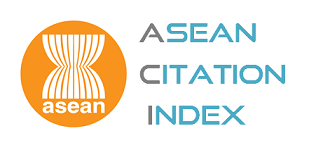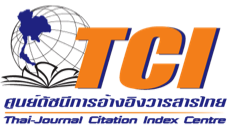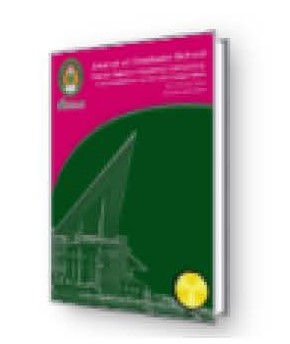การเปลี่ยนแปลงทางเศรษฐกิจ สังคมและวัฒนธรรมของกลุ่มชาติพันธุ์ผู้ไทย: กรณีศึกษา บ้านนาบัว ตำบลโคกหินแฮ่ อำเภอเรณูนคร จังหวัดนครพนม
Abstract
การเปลี่ยนแปลงทางเศรษฐกิจ สังคมและวัฒนธรรมของกลุ่มชาติพันธุ์ผู้ไทย: กรณีศึกษา บ้านนาบัว ตำบลโคกหินแฮ่ อำเภอเรณูนคร จังหวัดนครพนม
ECONOMIC THE SOCIAL AND CULTURAL CHANGES OF THE PHUTAI ETHNIC GROUP: A CASE STUDY OF NABUA VILLAGE IN THE KOKHINHAK SUB-DISTRICT OF THE RENU NAKHON DISTRICT IN NAKHON PHANOM PROVINCE
บทคัดย่อ
การวิจัยนี้มีวัตถุประสงค์เพื่อศึกษา (1) ความเป็นมาของกลุ่มชาติพันธุ์ผู้ไทยบ้านนาบัวตำบลโคกหินแฮ่ อำเภอเรณูนคร จังหวัดนครพนม (2) การเปลี่ยนแปลงทางเศรษฐกิจ สังคมและวัฒนธรรมของกลุ่มชาติพันธุ์ผู้ไทย บ้านนาบัว ตำบลโคกหินแฮ่ อำเภอเรณูนคร จังหวัดนครพนม(3) ปัจจัยที่มีผลต่อการเปลี่ยนแปลงทางเศรษฐกิจ สังคมและวัฒนธรรมของกลุ่มชาติพันธุ์ ผู้ไทย บ้านนาบัว ตำบลโคกหินแฮ่ อำเภอเรณูนคร จังหวัดนครพนม
วิธีการวิจัยเป็นการวิจัยเชิงคุณภาพ กลุ่มตัวอย่างได้แก่ ผู้นำชุมชน จำนวน 3 ราย ชาวบ้าน จำนวน 13 รายกลุ่มผู้รู้ จำนวน 3 ราย อดีตสมาชิกพรรคคอมมิวนิสต์แห่งประเทศไทย จำนวน2 ราย และข้าราชการจำนวน 3 ราย รวมจำนวนทั้งสิ้น 24 ราย เครื่องมือการวิจัยได้แก่ แบบสัมภาษณ์ แบบสังเกต และแบบสำรวจชุมชน การวิเคราะห์ข้อมูล เป็นการวิเคราะห์เชิงพรรณนา
ผลการวิจัย พบว่า(1)ความเป็นมาของกลุ่มชาติพันธุ์ผู้ไทยในอดีตเขียนว่า “ผู้ไท” หมายถึง อ้ายลาวหรือคนดาว มีถิ่นฐานอยู่แถบเมืองแถงเมืองไล แคว้นสิบสองจุไทย (ปัจจุบันคือเมืองเดียนเบียนฟูอยู่ทางตอนเหนือของเวียดนาม) ต่อมาไทยสร้างอาณาจักรจึงเติมอักษร “ย” ต่อท้าย หมายถึง คนไทยกลุ่มหนึ่งส่วนผู้ไทยบ้านนาบัวอพยพมาจากบ้านโพนสาวเอ้ อำเภอเรณูนครตั้งชุมชนเมื่อ พ.ศ. 2434 (2)การเปลี่ยนแปลงทางเศรษฐกิจ สังคมและวัฒนธรรมของกลุ่มชาติพันธุ์พบว่า มีการเปลี่ยนแปลงด้านสภาพเศรษฐกิจ คือการเปลี่ยนแปลงการผลิต การบริโภค การแบ่งสรรค์ การแลกเปลี่ยนเทคนิควิทยาการผลิต และการค้าที่พึ่งพาภายนอกซึ่งเป็นลักษณะของระบบทุนนิยมและบริโภคนิยม ส่วนการเปลี่ยนแปลงทางสังคม เป็นการเปลี่ยนแปลงกลุ่มสังคม ครอบครัว ชุมชน ชนชั้นและสหจร เช่น จากครอบครัวขยายเปลี่ยนเป็นครอบครัวเดี่ยว และการเปลี่ยนแปลงทางวัฒนธรรม เป็นการเปลี่ยนแปลงค่านิยม ศาสนา ภาษา นันทนาการ การศึกษา คมนาคม วิทยาศาสตร์ การเมืองและสาธารณสุขเช่น การรักษาอาการเจ็บป่วยด้วยแพทย์พื้นบ้านเปลี่ยนเป็นการรักษาด้วยแพทย์แผนปัจจุบัน (3) ปัจจัยที่ทำให้เกิดการเปลี่ยนแปลงทางด้านเศรษฐกิจ สังคมและวัฒนธรรมของกลุ่มชาติพันธุ์ผู้ไทย ได้แก่ ปัจจัยภายในเช่นปัจจัยด้านนิเวศวิทยา ด้านสภาพแวดล้อม และปัจจัยภายนอก เช่นจากนโยบายของรัฐ และการเมือง
ABSTRACT
The objectives of this research were to study (1) the background of the Phuthai ethnic group in Nabua Village, KhokHinHae Sub-District, RenuNakhon District, NakhonPhanom Province; (2) economic, social and cultural changes that have occurred within the group; and (3) factors that affected those changes.
This was a qualitative research based on interviews with 24 key informants, consisting of 3 community leaders, 13 villagers, 3 knowledgeable persons, 2 former members of the Communist Party of Thailand, and 3 civil servants. Data were collected using an interview form, an observation form, and a community survey form. Data were analyzed by descriptive analysis.
The results showed that (1) The term “Phuthai” originally meant Lao or Dao people who came from Muang Tang-Muang Lai in the Sibsongjuthai region (present day Dien Bien Phu in northern Vietnam). The Thai spelling of the name “Phuthai” was changed after the rise of the Thai empire and it now means “a group of Thai people.” The Phuthai in Baan Nabua moved there from Baan Pone Sao Ae, also in RenuNakhon District, and established the community in 1891. (2) Economic changes in the community included changes in production, consumption, allocation, exchange, production technology, and trade, which changed to be more dependent on external markets that were capitalist and consumerist. Social changes included changes in social groups, the family, the community, social classes and associations, such as a change from primarily extended families to mainly nuclear families. Cultural changes included changes in values, religion, language, entertainment, education, communications, science, politics and public health, such as a switch to using modern medicine more than traditional healers. (3) The main factors that affected these changes were the internal factors of environmental and ecological factors and the external factors of government policies and politics.
Downloads
How to Cite
Issue
Section
License
บทความทุกบทความที่ตีพิมพ์ในวารสารบัณฑิตศึกษา มหาวิทยาลัยราชภัฏสกลนคร ถือว่าเป็นลิขสิทธิ์ของบัณฑิตวิทยาลัย มหาวิทยาลัยราชภัฏสกลนคร









